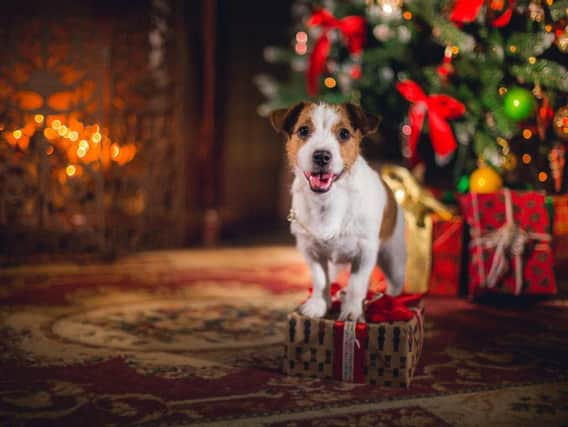Lancashire vet issues urgent advice to keep your pet safe this Christmas


IT’S the worst possible combination – a house full of new, tasty and interesting things to explore, and everyone too distracted to pay full attention to what the pets are up to.
According to veterinary surgeons at Ribble Vets, the Christmas period holds a number of hazards for pets – any one of which could spell misery for them, and you.
And, of course, the last thing anyone wants to do this Christmas and New Year, is to deal with a poorly pet.
Prevention is always better than cure. Here, with help from Ribble Vets, which has over 80 years’ experience of looking after local pets, we reveal the key danger points for pet lovers to be aware of this Christmas.
Chocolate
It wouldn’t be Christmas without chocolate treats, but just a small amount can make dogs seriously ill. Chocolate contains theobromine, which can cause vomiting and
diarrhea, possible tremors and fitting, and, in extreme cases, can prove fatal. The darker the chocolate, the more theobromine it contains. So keep all chocolate out of reach, including advent calendars and wrapped presents – dogs will find a way in if there’s something tasty in there. Remember too that cats, rodents and rabbits are also affected by
theobromine.
Christmas Dinner
All kinds of foods we enjoy on special occasions can be dangerous to pets, from the onions in the gravy to raisins and currants in the Christmas cake. Turkey bones are a choking hazard as they splinter easily, and remember not to leave your drink where a curious pet might find it, as alcohol has a more extreme effect on small animals.
Don’t be tempted to ‘treat’ your pets with extra rich food just because it’s Christmas. It could make them ill if they’re not used to rich, fatty foods. Stick to their usual meals and give them an extra pet treat so they’re not missing out.
Plants
Be careful when decorating your home, as plants such as lilies, poinsettia, mistletoe, holly and ivy can all make pets ill if eaten.
Decorations
Brightly coloured tinsel, tree lights and baubles are bound to attract pets - particularly playful cats. Pets that get hold of Christmas decorations risk injury from sharp edges, poisoning and electrocution.
Be prepared
Accidents can happen, so keep your vet’s details handy. Ribble Vets operates three surgeries with a fourth set to open in Leyland in January.
The team of 14 veterinary surgeons are skilled in everything from family pets to farm animals. An out-of-hours service ensures animals are always seen swiftly.
A spokesperson for Ribble Vets said: “Christmas is a time for all the family and, of course, you should enjoy it with your pets, they are part of the family.
But be aware that unfamiliar items can be of great interest to pets and they will investigate, sometimes with unfortunate results.
“It’s wise to make sure, before the holidays start, that you have checked your vet’s opening hours and have an out-of-hours number handy so that you can get help and advice should you need it. Should you realise that your pet has eaten something they shouldn’t, the quicker we see them, the quicker we can instigate treatment, so contact us urgently.”
Find out more by visiting www.ribblevets.co.uk. Contact Ribble Vets on 01772 746393